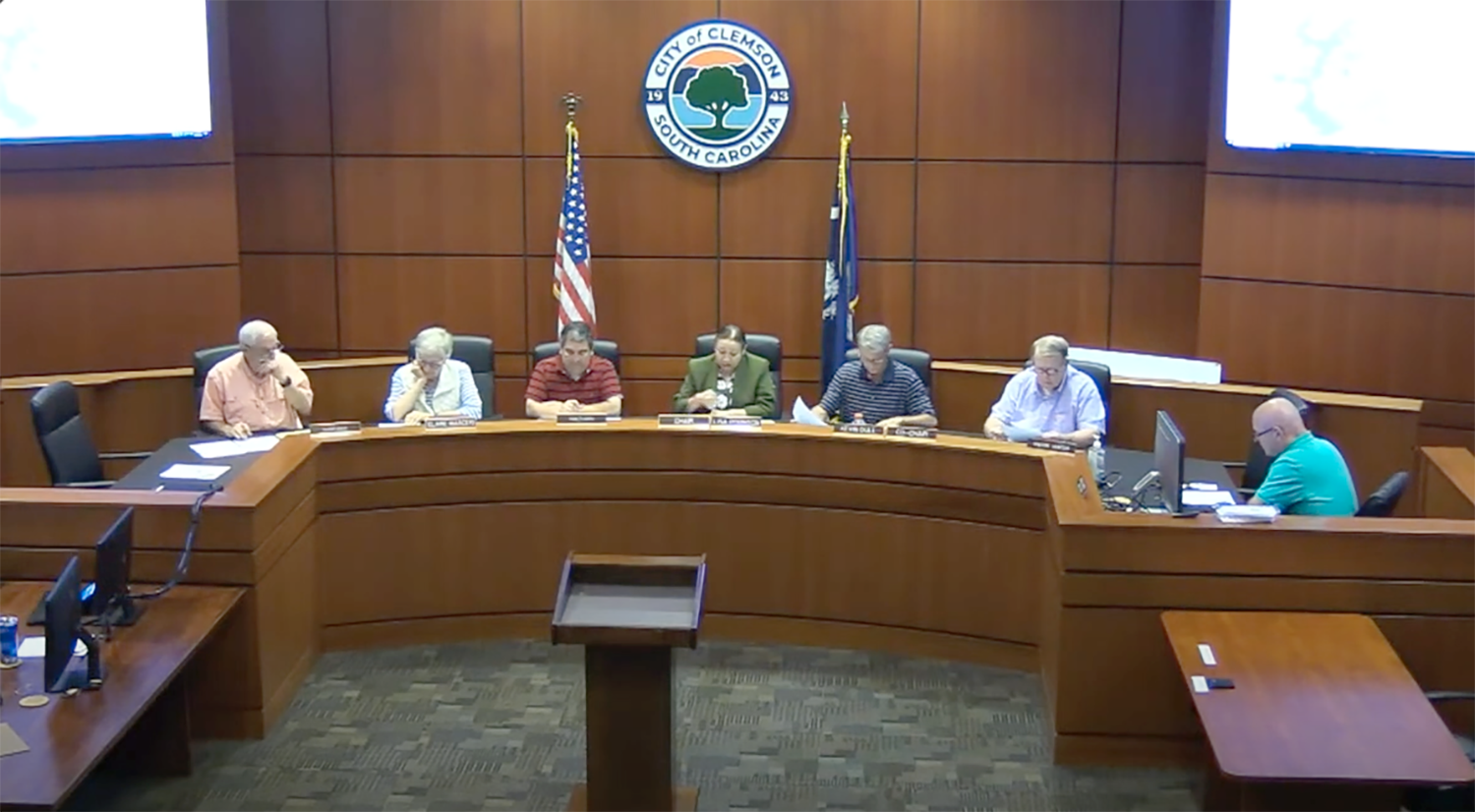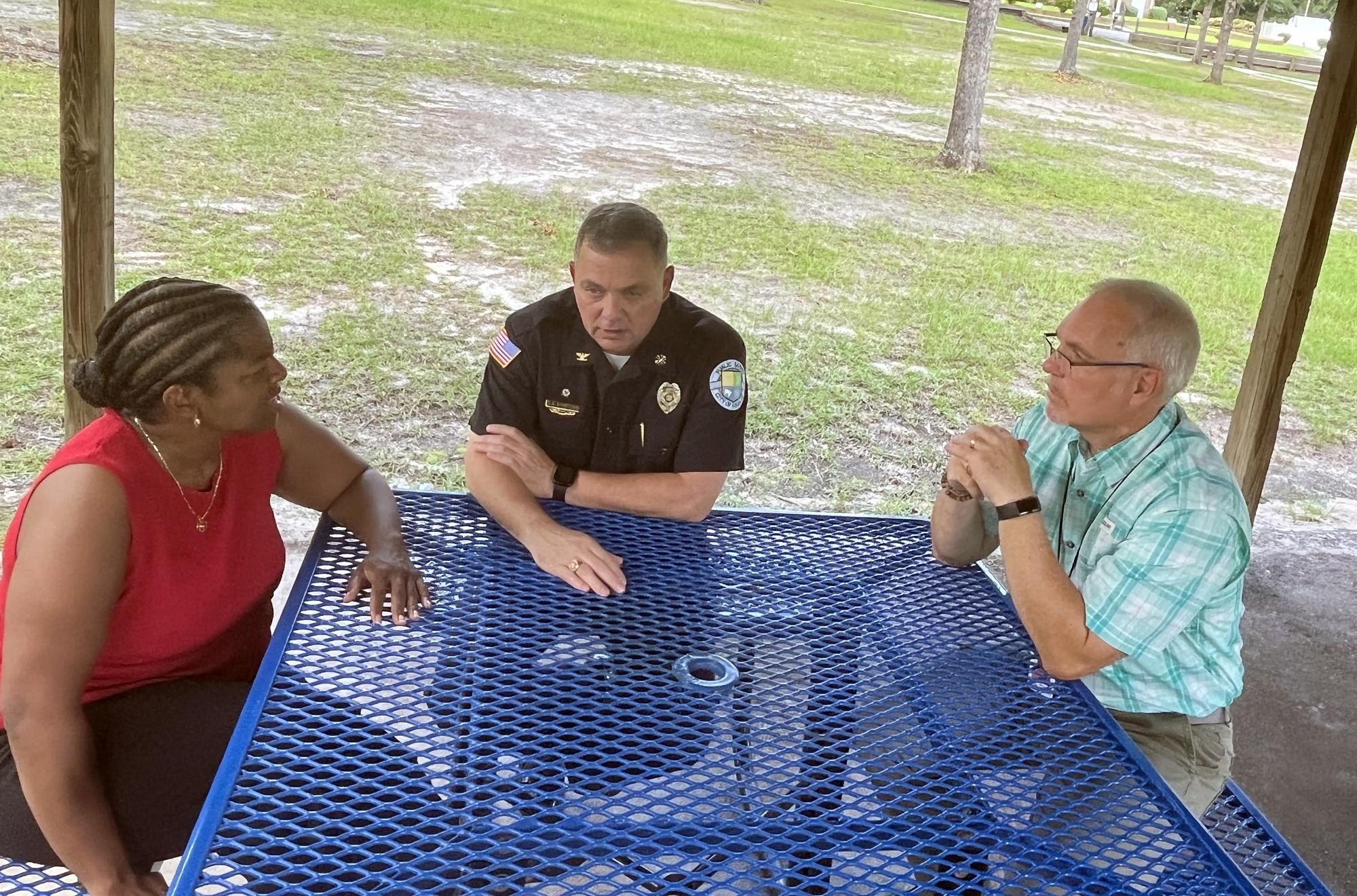At a time when many residents have sought more dialogue with their local governments on policing issues, police departments in South Carolina have worked to find ways to bring residents into discussions and even reviews of their operations. Whether it’s with an advisory board or a board tasked with reviewing complaints, police agencies around the state want their residents to know they are listening to their concerns.

The City of Clemson Police Advisory Board schedules monthly meetings. Photo: City of Clemson.
The City of Clemson, for example, has a police advisory board with nine members, including one local high school student and one Clemson University student. The members are appointed by city council and the board meets once a month.
The board hears from Clemson Police Chief Jorge Campos on crime statistics and any issues facing the police department. Meetings of the police advisory board often include a guest speaker like the fire chief or the Clemson University police chief.
“We run it like a council meeting,” Campos said. “There is a chair, a vice chair and an agenda.”
Lisa Robinson, an attorney by training who works at Clemson University, is in her second term on the city’s police advisory board, and serves as the chair.
“Recently we heard from an organization called Project Lifesaver that one of the lieutenants at the department brought to talk to us about,” Robinson said. “It's a device that they can use for tracking Alzheimer's patients and others who may have a tendency to wander off or might get lost … It's really been interesting just to learn a little bit more about the policing that goes on in our community, and to give just regular citizens a voice with the department.”
The board helps provide resident input into city operations.
“Anytime the city is considering adding an enforcement ordinance or making modifications to an enforcement ordinance directly related to the police, it goes through the police advisory board,” Campos said. “We'll do a presentation of what we're trying to accomplish, and if they agree, we'll put a work group together and work with not only board members but with other citizens in town.”
One recent example was a public work session on proposed golf cart regulations.
“This is community engagement, community advocacy work, just in terms of listening to our neighbors,” Robinson said. “Things that may be of issue in the community, and working with the police department to bring those things to light. Then, also working with the city council on different issues that may be relevant. I think all the board members would agree that it's really interesting work.”

Aiken Citizens Review Board Chair Carmen Landy, left, talks to Aiken Department of Public Safety
Director Charles Barranco and Karl Odenthal, board liaison. Photo: City of Aiken.
In the City of Aiken, public engagement with the police involves a citizens’ review board that reviews how the Department of Public Safety handles complaints. The 10-member board is appointed by Aiken’s mayor and was created in 2016.
Karl Odenthal, a retired police officer, serves as a liaison between the review board and the department. If a complaint is made to the department about an officer, the officer’s supervisor does the initial investigation and reports the findings to a team of senior officers. Command staff would then review complaints and determines whether they agree with the supervisor’s findings or whether more investigation is warranted.
“They basically do a second review of the case, then they make their final decision on disciplinary action, if any,” Odenthal said. “So each complaint gets a review two times in-house. Once public safety has completed their investigation, then they would give that information to me.”
Odenthal provides all the materials from the investigation, including video and audio to the citizens review board, which discusses whether the action taken by the department was appropriate. The review board does not have the authority to change a decision made by the in-house investigators.
“Once the discipline has been handled, they can't overturn a case that public safety decided already,” Odenthal said. “But what they can do is help shape future policy. And it's good to have a second voice, because you really get a different perspective when you're looking at the citizens’ viewpoint.”
Odenthal said if the board feels there needs to be a change in police policy, they can make a recommendation to the police department.
“The review board takes their role seriously,” he said. “It's not a paid position, but they come in on their time off and review these cases … And it's not an adversarial relationship. The department is open to suggestions to be better. It could be a good opportunity — a learning opportunity for the officer and for the department.”
The City of Florence combines both approaches with both an advisory board, established 12 years ago, and a review board that was created about three years ago.
The citizens advisory board meets each month with Florence Police Chief Allen Heidler.
Its members, Heidler said, come from “every corner of the City of Florence,” and include members of the clergy, teachers, and housing authority representatives, among others.
“We just talk about issues going on with the police department in their specific areas,” Heidler said. “It was created for more visibility with the community and to make ourselves more available to them, to establish better relationships with the community and to be open and honest about everything we're doing.”
The review board which consists of seven voting members and two nonvoting members from the fire and police departments, was created by city council after a new member expressed concerns about the relationship between the public and the police. City council established the board and appoints its members to serve three-year staggered terms. The board members also must complete the city’s Citizens Police Academy.
“That’s so they'll actually have some knowledge about police work, behind-the-scenes police work,” City Manager Scotty Davis said.
The board meets quarterly and reviews any concerns that might be brought before the board and makes recommendations to the city manager.
In its three years of existence, the board had only one complaint to handle, said Florence Human Resources Director Jennifer Krawiec, who is the staff member assigned to the review board.
“Ultimately, the city manager has the final say over [complaint resolutions],” Krawiec said. “It’s very similar in set up to our grievance committee for employees.”
Heidler said the added layer of review is not a problem for his officers, who wear body cameras that show every interaction they have with the public, and the fact that only one complaint has gone to the review board shows that the city’s in-house investigations are thorough.
“With only one going before the board, we've obviously satisfied a bunch of people who have made complaints, whether they are sustained or whether they're unfounded,” Heidler said.
